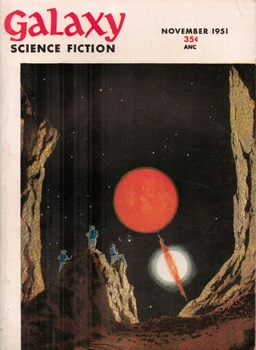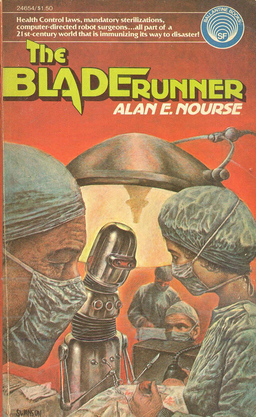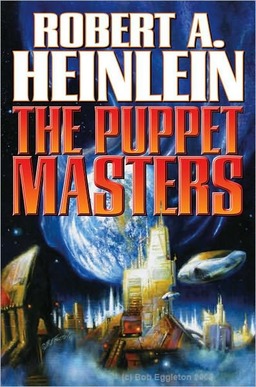Galaxy Science Fiction, November 1951: A Retro-Review
 Galaxy s November, 1951 issue began (as it usually does) with a foreword from the editor, Horace Gold. Gold addresses the purpose of science fiction, stating:
Galaxy s November, 1951 issue began (as it usually does) with a foreword from the editor, Horace Gold. Gold addresses the purpose of science fiction, stating:
What science fiction must present entertainingly is speculation. Not prophecy, but fictional surmises based on present factors… When a story hits a future development on the head, it should be considered a minor accident; its main job was not to predict but to conjecture what might happen if certain circumstances followed certain lines of development.
Regarding the basic plotlines around science fiction, such as interplanetary flight, time travel, and the like, he writes: “Will these worlds ever exist? They may or may not; it doesn’t matter. The possibility is what counts in science fiction, not the certainty.” He concludes that writers “are examining prospects, pleasant and unpleasant alike, and that, if it produces good stories, is the legitimate province of science fiction.”
“Sea Legs” by Frank Quattrocchi — Robert Craig leaves a life of deep space service to live on Earth. But Robert has never known that world; in fact, he has never known constant gravity. He finds there are many more regulations on Earth than in space and that loyalty to the government is of utmost concern. Soon, Robert ends up breaking rules he never knew existed and he flees into radioactive territory to try to escape incarceration.
It took me some time to get into this story, but by the point Robert is on the run, I was finally rooting for him. I think there was enough setup for this to be the opening chapters of a novel, so it seemed like too much to me.
“Tiger by the Tail” by Alan E. Nourse — A pocketbook can hold anything without bulging or gaining weight. The mysterious item ends up in the hands of researchers who find that anything aluminum disappears inside the hole, but they don’t know where it goes. Anything not of aluminum is pushed back, regardless of how much force they use.
 This is a clever tale, and I’ve seen similar notions elsewhere, which makes me think this story stuck with people through the years. The characters don’t matter, but the concept is what drives the story.
This is a clever tale, and I’ve seen similar notions elsewhere, which makes me think this story stuck with people through the years. The characters don’t matter, but the concept is what drives the story.
An interesting note about Alan E. Nourse is that he wrote a novel titled The Bladerunner (also published as The Blade Runner), but this was not the basis for the 1982 movie Blade Runner. That movie was based on Philip K. Dick’s story “Do Androids Dream of Electric Sheep?” There was a screenplay for Nourse’s novel, but it was never produced. However, Hampton Fancher, a screenwriter for the movie Blade Runner, had a copy of the Nourse screenplay and preferred that title for the film adaptation of Dick’s story. Ridley Scott (director of Blade Runner) subsequently bought any rights to the title “Blade Runner” that might have arisen from either the Nourse novel or its screenplay.
“Zeritsky’s Law” by Ann Griffith — Freezing people began with the accidental freezing of a cat. The Zeritskys start the business, and it solves a lot of problems for people: allowing criminals to escape punishment for their crimes, waiting for a rich inheritance, or to suspend your life between Hollywood acting projects (so as to prevent aging). But it only takes one emotional case to bring the business crashing down.
The story reads like a magazine article that chronicles a business. It held my attention.
“Self Portrait” by Bernard Wolfe — Oliver works in cybernetics, but he’s in the prosthetics labs, which isn’t where he wants to be. His ambition is to get into MS, working on the perfect cybernetic mind, not working on artificial legs. Oliver decides to tackle problems in his labs that will draw grand attention from the press and use that as leverage to get into the most prestigious area.
I think this was intentionally written to draw the reader against Oliver from the beginning, and it’s effective. But it feels odd to read a story where I’m not rooting for the protagonist — not because he’s a villain, but simply because he whines. As a result, I never really connected with the piece.
 “Psycho Tennis, Anyone?” by Lloyd Williams — Grant invented the game of psycho tennis, where two players use their mental powers to control the ball. The game is innocent enough, until one of the up-and-coming players named Slag begins killing his opponents with his high-speed shots. Grant believes such attacks are impossible, given the ball’s design; any player ought to be able to block such attacks with simple mental efforts. When Slag’s latest victim is one of Grant’s friends, Grant investigates the cause and eventually comes out of retirement to challenge Slag himself, hoping to finally learn the secret of Slag’s murderous success.
“Psycho Tennis, Anyone?” by Lloyd Williams — Grant invented the game of psycho tennis, where two players use their mental powers to control the ball. The game is innocent enough, until one of the up-and-coming players named Slag begins killing his opponents with his high-speed shots. Grant believes such attacks are impossible, given the ball’s design; any player ought to be able to block such attacks with simple mental efforts. When Slag’s latest victim is one of Grant’s friends, Grant investigates the cause and eventually comes out of retirement to challenge Slag himself, hoping to finally learn the secret of Slag’s murderous success.
I enjoyed the way this story played out. It reads a bit like a detective story, but with science fiction elements as well.
“The Puppet Masters” (Part 3) by Robert A. Heinlein — The war against the Titans turns worse. Showing a bare back isn’t enough of an indicator that someone is hag-ridden. The slugs can control a person as long as they are in contact with any part of the person. So now everyone is either nude or close enough to it that leaves no room for slugs.
Given how much of the country (and likely parts of the world) are under the control of the aliens, the only option is to find or create an illness that would kill the slugs without killing their human hosts. But it’s a tricky proposition — it has to be an illness the human would be susceptible to, and it must be deadly but with some possibility of survival.
I’m trying not to spoil the plot too much. I know; this story is over 60 years old, but I still try to avoid spoilers for those who are considering reading these stories.
I like the way the novel concludes. It’s a great action/science fiction tale, bordering on horror. I recommend reading it if you have the chance.
Matthew Wuertz’s last retro review for us was the October 1951 issue of Galaxy Science Fiction.
This editorial really proves to me what a visionary Horace Gold was. The days of selling science fiction as a predictive genre must have been coming to an end in 1951, though they lingered well into my childhood days in the 1970s. I remember being taught how remarkable the works of Jules Verne were, primarily because of all of the machines he predicted. Does that really make his stories better? If you recall, in 20,000 Leagues Under the Sea, the crew makes a journey to the south pole without touching land. Oops. Bad prediction, but still an excellent story. It’s about artistry, not lucky or even informed guesses.
Mr. Gold concludes: “I think moralizing should be left to ministers, while commentators and astrologers keep their claim to 20/20 foresight.” There is a lot of valid commentary packed into that paragraph.
“Sea Legs” was not terribly memorable for me. Galaxy’s mantra promised that we would never read a western transposed into space opera. This started like sea story transposed into a post-war society, but then rambles slowly into a tale of escape and an emerging rebellion against the new culture of sameness. There could be a message here about old (sailor? astronaut?) dogs learning new tricks, or the inevitable cycle of organization and rebellion, or new hope after the ubiquitous 1950s vision of nuclear war. I am not really sure.
Now “Sea Legs” has me rambling. Nope, this one did not work for me.
“Tiger By The Tail” reminded me of “Costigan’s Needle,” a novel from the same era that I read a few years ago at my father’s request. The concept of the magic portal must have had some popularity. The speculation was fun and the unresolved ending was a nice touch.
For some reason, I am always intrigued by medical speculation. Biology, and evolution in particular, are fascinating to me, though I have little background in them other than some hobby reading. “Zeritsky’s Law” is about the business of freezing people for the future, but it really is more about business and human nature than medical science. This story does a fine job of taking a classic premise which promises a utopian outcome and then explaining how we will all screw it up.
I’ll conclude my retro-review-response in a day or two. Sleep time…
Gus,
You’re stopping at 1:30? Where’s your dedication? 🙂
I appreciate your thoughts. It seems that I liked “Sea Legs” a bit more than you. Granted, I wasn’t thrilled with it out of the gate, but it grew on me over time.
Interesting that there were cryogenics stories before there was a term for it. I don’t recall Griffith giving a term for it in “Zeritsky’s Law”, though it obviously would have been something different. But I’ll admit I haven’t read a “freezing” story quite like this one, and I think it could still be published today without seeming cliché.
It’s even worse than you think, Matthew. The clock in this forum is set for the east coast and I live in Oregon, so I actually checked out at 10:30. This is what happens when you have to get up in time to teach a zero period jazz band every day. I miss having a normal schedule. You should see the looks I get from my family when I announce I am going to sleep at 8:00 pm.
I didn’t mean to be too hard on “Sea Legs,” but I always struggle to enjoy a story when it seems to run on and on needlessly (in my opinion, of course). The locales and the focus of the story seemed to shift at random. It might be worth another read.
I did connect with Oliver from “Self Portrait” to some extent. He represents a part of us that we don’t necessarily want to manifest or even admit to. He is a shameless opportunist who enhances, and ultimately (spoiler) destroys an ex-football player to further his career. I would never go to that extreme to advance my career (I hope!), but we all have a competitive spirit that can become ugly at times. The flawed protagonist makes for a thoughtful story when it is done well, and I thought this one was, indeed, successful.
I can’t remember where they hauled poor Kujack to. I am sure it wasn’t good.
Though I do feel for poor Kujack, I don’t always enjoy having a sports backdrop for my sci fi readings. We read to escape, right? Sports are one of the main things I try to escape from (long story). “Psychotennis” was indeed a detective story with sports and romance as the foundations, and with the speculative nature of science fiction as the essential element. It was interesting to watch the mystery unfold, even though I saw through it early in the story. The author takes the unusual step of giving a Hardy Boys style ending by explaining everything that happened, rather than the Ellery Queen approach of leaving much of it implied and unstated. I enjoyed this story even if it lacks the layers that more enduring mysteries contain.
I am not as good at avoiding spoilers as Matthew, so I’ll try to behave myself while I discuss “The Puppet Masters.” Indeed, things are looking bad and even hopeless for the free world as the slugs continue to establish themselves, but a desperate plan might just be the longshot to save everyone…
The plot does follow some cliched pulp-style templates, but as usual with Heinlein, it does not matter because the writing is so enjoyable and the characters are people we would want to know and join on their adventures. The coda was a nice touch. Victory is not complete without vengeance! Admit it, everyone who has read this was excited to see that the human race will not settle for mere victory but needs to see total annihilation before we are satisfied!
Again, some parts of us are better left un-manifested and unrealized. Doesn’t mean I can’t enjoy a rowdy good story.
Yes, highly recommended.
See you next month. It is nice to know that there are more people than just me who read these stories from the old digests. Maybe more people will join us???
Gus,
I loved the part in Self Portrait where they allow the press conference with the “success story” and then have him arrested the following day. And the protagonist is so matter-of-fact about this.
I’m glad you enjoyed Puppet Masters. Heinlein for the win.
Yes, we need more people joining in our monthly Galaxy discussions.